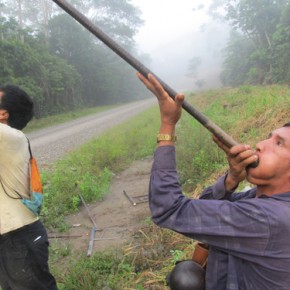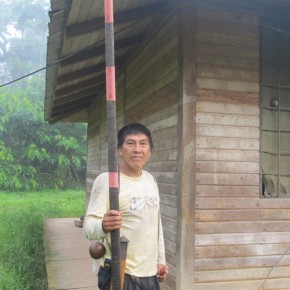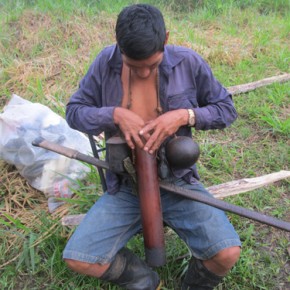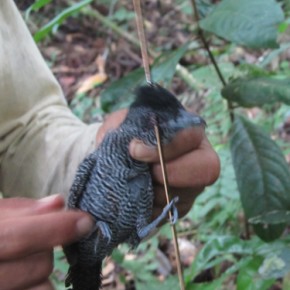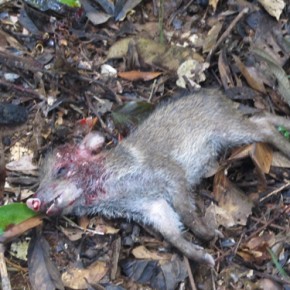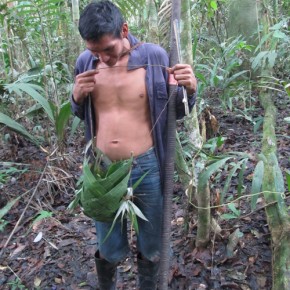by Aliyya Swaby:
“Aren’t you, well, afraid of going to visit the Waorani?” asked James, one of about 15 scientists and visitors at the Estación Científica Yasuni. The station is in Yasuni National Park, in the Ecuadorian Amazon, and I have been staying here for about a week to do firsthand research for my journalism project.
“Afraid?” I responded. Truthfully, I hadn’t thought it through well enough to be scared. I had come to the station primarily with the purpose of speaking with scientists — contact with the indigenous tribes in the area was a recent development.
“Talking with the Waorani is … difficult,” my roommate Andrea said simply, when I later asked her what exactly I would be up against. She told me stories of the Waorani attacking outsiders with little provocation, especially after they had been drinking. “But you should be fine with a guide in these communities nearby,” she added cheerily. Still, I was at least a little nervous about my upcoming excursions.

I had done some research about the Waorani tribe before coming: I read accounts of how the building of a major road through their territory changed their way of life, scientific articles about the future of sustainable hunting with the introduction of firearms into their society, and most of Joe Kane’s firsthand non-fiction account “Savages” (a bible for many Americans traveling to Yasuni for the first time). I got a picture of the Waorani as a people figuring out how to deal with forced cultural modifications. Generally, it didn’t seem like they were doing so well.
On Thursday I woke up at 6 a.m. to go hunting with two Waos from a community named Guiyero about a half hour drive from the station down the Pompeya Sur-Iro road. Bolivar and Agua met me at the side of the road and we took a bus a few kilometers down before plunging into the forest. The two were dressed casually in long sleeved shirts and long pants which contrasted with the weapon of choice for the morning: a 10-foot-tall blowgun made of natural tree fibers and paired with poison-tipped arrows.

As we hiked through the forest, Agua carried the long, narrow weapon with one end resting against his shoulder and Bolivar followed behind us clearing the dense vegetation with a red-handled machete. Also a last minute addition to our trio: a stray hunting dog named Venado (deer, in Spanish). I tripped over roots, slipped down muddy slopes, and tried to avoid getting stung by the notorious conga ants, while the three of them sauntered through the forest.
Bolivar is an experienced eco-tourism guide and only lives in the village part-time, also spending some time with his family on the coast. Like many Waorani below a certain age, he speaks fluent Spanish (along with 5 other languages, most of them tribal) and pointed out animal footprints and giant lianas to me throughout the trek. When I wasn’t too out of breath, I asked him questions about his life in Yasuni and he, too, was curious about life in the United States.
Our hunt was a success — Agua used the blowgun to net a small bird and the dog Venado killed a small pig. (Bolivar told me later that he and his family ate the pig for dinner along with yucca and plantain.)

Bolivar seems like an example of a Wao who appears to have adapted perfectly to the changing times in a way that benefits both him and the environment. When he hunts in Yasuni, he makes a conscious decision never to use guns, partly because they’re too loud (he said while cringing and clutching his ears). Though his family used to commercially hunt and sell the extra meat at the market in Pompeya, they stopped a few months ago and now only subsistence hunt. He works as a guide in frequent contact with the outside world, teaching people about the ecology of the forest.
Unfortunately he is in the minority of Waorani right now — most haven’t yet figured out how to balance cultural tradition and success in a Westernizing society. It will take a lot of work, but the local governmental bodies and related organizations working in Yasuni should be — and in many cases, are — attempting to reach Bolivar’s golden standard by offering education and sustainable alternatives to commercial hunting.
Here are more images from the hunt:
